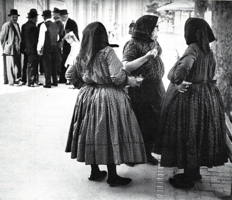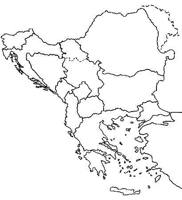
|
The Society of Folk Dance Historians (SFDH)
Sex and Power in the Balkans
[
Home |
About |
Encyclopedia | CLICK AN IMAGE TO ENLARGE |

|
 American and European visitors to the mountain regions of the Balkans quickly notice signs that sex roles are more clearly differentiated there than they are in the visitors' home countries, where inequalities between the sexes tend to be blurred.
American and European visitors to the mountain regions of the Balkans quickly notice signs that sex roles are more clearly differentiated there than they are in the visitors' home countries, where inequalities between the sexes tend to be blurred.
The effect of the Women's Movement no longer allows us to believe that there is a contrast between sexual equality, on the one hand, and inequality on the other: the difference is one of a degree rather than of kind. All of Europe and, subsequently, the United States, has been strongly influenced by what older generations of scholars refer to as "patriarchal" family and community organization, a social form in which sex roles are clearly distinct and in which men are clearly superior to women.
In many regions of the Balkans, this kind of structure still can be seen in purer form than in most other areas of Europe. By studying the nature of sex status differences in terms of the total way of life of people living in such communities, we can improve our understanding of why such forms have come into being and have persisted over the ages. By understanding the conditions that encourage sexual inequality, we will have a basis for predicting the conditions that lead to change.
In preparing this article, I have supplemented my own observations in Yugoslavia with studies that other anthropologists have carried out in Greece, Bulgaria, and Albania.
Among the rural peoples of the Balkans, there is a great amount of variation in community and family structures. Basic features, however, are nearly universal. The primary units are households organized on the basis of male inheritance, with women marrying into their husbands' families. This exclusive male inheritance links together a line of men with its resources in farm land, pasture rights, and livestock. In some regions, there is further development of male kin groups, with lineages, clans, and tribes all traced through male inheritance. Marriages are arranged by the parents, with an eye to their future relations as in-laws. Bride and groom may be strangers, and at most are usually barely acquainted before the wedding. This is equally difficult for both in terms of their marital adjustment, but the bride makes a much more radical change than does the groom. Whereas he goes on living in his natal household, amidst family and kinsmen, the bride leaves her own home to join a family in which she is a minority of one. Extended families, in which the parents and their sons form a core to which are added the in-married wives and eventually, their children, are widespread. Marriage rules require that brides of one household be unrelated to their husbands' families and to each other. Thus, each woman individually joins an ongoing establishment, in which her husband's first loyalty is to his parents, brothers, and close male kinsmen.
In acquiring a bride, the household acquires two important assets: an addition to its work force for domestic chores and agricultural labor, and a bearer of male heirs to perpetuate the family. A woman can secure a position in the group only as the mother of sons. Eventually, she can have authority over her daughters-in-law and influence over her sons, but always within the confines of the household sphere and subject to the higher authority of the senior man.
When women appear in public, they are expected to defer to the men of their household, constantly to show submission. Behavior is patterned by stylized shows of deference, one such being that women walk several paces behind their husbands. Within the household, too, behavior reiterates the theme of sexual inequality. In some pastoral regions of Yugoslavia, daughters-in-law were required to show respect by kissing the hands of all males in the household, including those of little boys. In Serbia, formal seating arrangements are by rank, with all males down to adolescents seated at the head of the table, and women seated below the lowest-ranking males. Women's subsidiary, bakstage status is re-enacted whenever there are guests: men sit with the guests and make the display of hospitality while women prepare food and carry it to the table, but do not sit with the guests. The tribesmen of Northern Greece symbolize the wife's lack of distinct social identity by ignoring her own first name; after marriage she is known by the possessive form of her husband's first name ("John's").
As might be expected with such extreme forms of male supremacy, there is severe sexual restriction over women. Brides are expected to be virgins, and those who are not have met with disgrace and even death. There is no similar restriction for bridegrooms. Fidelity is required of wives, but not of husbands. In some regions of Montenegro, Albania and Greece, the folk tradition prescribed the death penalty for adulterous wives – to be administered by her husband, father, or brother. A lesser physical sanction against all forms of misbehavior is wife-beating, which was, in the past, actually endorsed as a reassertion of male authority over a troublesome woman.
In order to understand the causes for the subordination of women to men within the household, it is necessary to understand the way in which the household relates to the world outside it. Although states and empires have ruled over the Balkan region for more than two thousand years, they have rested lightly in the mountain region, leaving local groups to carry out their own conflicts. The survival of a family depends upon its control over land and flocks of animals. Should this be threatened, there was, in the past, no higher authority to step in and to defend property rights. The clan and tribal structure in many regions operates as a system of alliances, to defend and advance common interests against rival groups. The men of a property-holding group take an aggressive stance, threatening off all contenders. In mountain areas of Yugoslavia, men formerly went about fully armed, ever prepared for combat, and oral song traditions glorify past battles against rival tribesmen, as well as against the Turks. Men's behavior is prescribed by warrior ideals of masculine bravery. Challenges to the stance of an individual man must be met, because they are ultimately challenges to his family's control over its livelihood, in the form of sheep and pasture rights. An affront to one man provokes his entire kin group, and killing invokes blood feud.
In order to understand the reasons for the dramatic displays of masculinity so characteristic of the region, it is necessary to see how they function to promote group survival in an essentially competitive environment. I am suggesting that the aggressive stand exists for essentially defensive purposes, protecting one family's hold over its resources, thereby ensuring its survival.
The ecological conditions of pastoral agricultural life in these regions have led to structures based on male-centered kin groups, in which loyalty is established for common defense. There is a logic to patrilineality and the exclusion of women from inheritance, so that they are transferred, through marriage, from one kin group to another. The formal structure does not really include women, and would operate most neatly if they did not exist. The problem is that women do exist and are necessary, obviously, for group perpetuation. The problem for the male groups is to utilize women for their necessary functions, while preventing them from weakening the group's position in its external struggles. There is no natural basis for the loyalty of wives acquired from other kin groups, and yet the family must depend on these women, whose interests do not automatically coincide with it. Keeping the behavior of women in line with the interests of the group involves a problem of control, and the elaboration of mechanisms for keeping women in their place demonstrates that this is no easy matter. The displays of control over women are part of the public stance of strength made by each group as it wards off competitors and defends its resources. The external structure of the patriarchal group is in conflict with its internal realities: as men busy themselves daling with the outside world, they depend on women to keep things running smoothly at home. Because the structure denies an equal place to women, their loyalty is ensured coercively, through physical reprisals as well as the more subtle rules controlling sexuality and public demeanor.
It is important to understand how traditional cultural systems have developed in order to see how they will change. In the rural areas of the Balkans, there has been no basis for greater sexual equality as long as the conditions prevailed which have been described here. In particular, women had no options except to become wives in households in which they were subordinated to their husbands' kinsmen, and men had no alternative to carrying on their struggles against rivals.
Today, this whole social basis is being swiftly undermined in urban areas in which women have jobs and can be independently self-supporting. The personal aspects of these traditions take far longer to disappear (as we know in the United States). There are important areas, however, in which change has already come. In a study I conducted in a Serbian city, for example, I found that parents from peasant backgrounds have the same aspirations for daughters as for sons, and plan to give them equal careers. This provides a basis for another way of life, in which sexual inequality is not intrinsic to the structure of survival itself.
DOCUMENT
- Balkans, a region.
Used with permission of the
Center for Traditional Music and Dance Archive, www.ctmd.org.
Printed in Spring Folk Festival 1973.
This page © 2018 by Ron Houston.
Please do not copy any part of this page without including this copyright notice.
Please do not copy small portions out of context.
Please do not copy large portions without permission from Ron Houston.